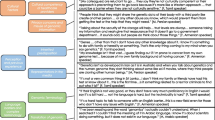Abstract
SLANG—Sensitive Language and the New Genetics—is a concept that arose out of informal discussions between a number of interested parties, both consumers and professionals, who were becoming increasingly uneasy with some of the language commonly used in medical genetics. Some language choices were felt by the authors to be inappropriate for a variety of reasons. Poor language choice may impede an individual's understanding of a genetic condition or important medical information and the chosen words themselves may simply be perceived as discriminatory and even offensive.
SLANG is an important concept to explore partly because literature in this area confirms that language choices in medical settings can be of great significance to both patients and families. Studies have shown how language choices impact on professional practice by, as one example, changing the intended meaning of medical information and affecting individual perception of risk and choice which, in turn, may affect individual or familial well-being. In addition language choice has the power to affect how individuals perceive themselves and are viewed by others. This paper presents the results from our pilot study and discusses the implications for health professionals with particular reference to medical genetics settings.
Similar content being viewed by others
References
Abramsky, L., & Fletcher, O. (2002). Interpreting information: what is said, what is heard- a questionnaire study of health professionals and members of the public. Prenat Diagn, 22, 1188–1194.
Allsop, J., Jones, K., & Baggott, R. (2004). Health consumer groups in the UK: a new social movement? Sociology of Health & Illness, 26(6), 737–756.
Bastian, H. (1998). Speaking up for ourselves: the evolution of consumer advocacy in health care. International Journal of Technology Assessment in Health Care, 14, (1)3–23.
Baty, B. J., Kinney, A. Y., & Ellis, S. M. (2003). Developing culturally sensitive cancer genetics communication aids for African Americans. Am J Med Genet A, 118(2), 146–155.
Benkendorf, J. L., Prince, M. B., Rose, M. A., De Fina, A., & Hamilton, H. E. (2001). Does indirect speech promote nondirective genetic counseling? Results of a sociolinguistic investigation. Am J Med Genet, 106(3), 199–207.
bmj.com (2002). Editors choice. ‘Ban a word for Christmas and please an old journal’. British Medical Journal, 325, November 2002.
Briffa, T. (2002). ‘Am I a defect or abnormality?’ GSNV Newletter, Melbourne.
Chapple, A., May, C., & Campion, P. (1995). Parental guilt: the part played by the Clinical Geneticist. Journal of Genetic Counseling, l4(3), 179–191.
Chapple, A., Campion, P., & May, C. (1997). Clinical terminology: anxiety and confusion amongst families undergoing genetic counseling. Patient Educ Couns, 32, 81–91.
Condit, C. M., Dubriwny, T., Lynch, J., & Parrott, R. (2004). Lay people's understanding of and preference against the word “mutation”. Am J Med Genet A, 130(3), 245–250.
de Crespigny, L., Chervenak, F., & McCullough, L. (1999). Mothers and babies, pregnant women and fetuses. British Journal of Obstetrics and Gynaecology, 106, 1235–1237.
Gordon, C., Prince, M. B., Benkendorf, J. L., & Hamilton, H. E. (2002). “People say it's a little uncomfortable”: Prenatal genetic counselors' use of constructed dialogue to reference procedural pain. Journal of Genetic Counseling, 11(4), 245–263.
Grbich, C. (1999). Qualitative research in health: An introduction (pp. 26–57), Chapter 2. Australia: Allen and Unwin.
Holmes, J. (2001). An Introduction to Sociolinguistics (Second edition, p. 331). UK: Pearson Education limited.
Kessler, S., & Levine, E. K. (1987). Psychological aspects of genetic counseling. IV. The subjective assessment of probability. Am J Med Genet, 28(2), 361–370.
Linell, P., Adelswrd, V., Sachs, L., Bredmar, M., & Lindstedt, U. (2002). Expert Talk in Medical Contexts. Research on Language and Social Interaction, 35(2), 195.
Rothstein, J. M. (1991) Sticks and Stones. (Editorial) Physical Therapy, 71(7), 498.
Sarangi, S., Bennert, K., Howell, L., & Clarke, A. (2003). ‘Relatively speaking’: relativisation of genetic risk in counselling for predictive testing. Health, Risk & Society, 5(2), 155–170.
Shiloh, S., & Sagi, M. (1989). Effect of Framing on the Perception of Genetic Recurrence Risks. American Journal of Medical Genetics, 33, 130–135.
The Back Letter (1994). Expensive choice of words (Newsletter) April, Vol. 9, No. 4. Lippincott, Williams and Wilkins.
Titchkosky, T. (2001). Disability: A Rose by Any Other Name? “People-First Language in Canadian Society. Canadian Review of Sociology and Anthropology, 38(2), 125–140.
Ward, O.C, (1999). ‘John Langdon Down: The Man and the Message’ Down Syndrome Research and Practice, 6(1), 19–24. The Down Syndrome Educational Trust, UK.
Author information
Authors and Affiliations
Corresponding author
Rights and permissions
About this article
Cite this article
Hodgson, J., Hughes, E. & Lambert, C. “SLANG”—Sensitive Language and the New Genetics—an Exploratory Study. J Genet Counsel 14, 415–421 (2005). https://doi.org/10.1007/s10897-005-5886-5
Published:
Issue Date:
DOI: https://doi.org/10.1007/s10897-005-5886-5




